The Samsung 950 Pro PCIe SSD Review (256GB and 512GB)
by Billy Tallis on October 22, 2015 10:55 AM ESTMixed Random Read/Write Performance
Most real-world use consists of a mix of reads and writes, and interleaving the two often poses a particular challenge to drive controllers. This mixed random access test is conducted across a 16GB span of the drive, but on a full drive and with a queue depth of 3.
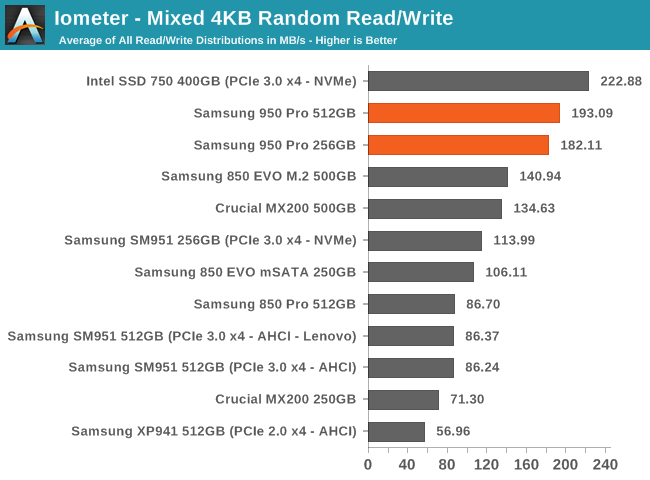
Mixed random access seems much improved over Samsung's earlier M.2 drives, and the 950 Pros fall behind only the Intel SSD 750. The 512GB drive is well behaved here and surpassing the 256GB drive as it should.
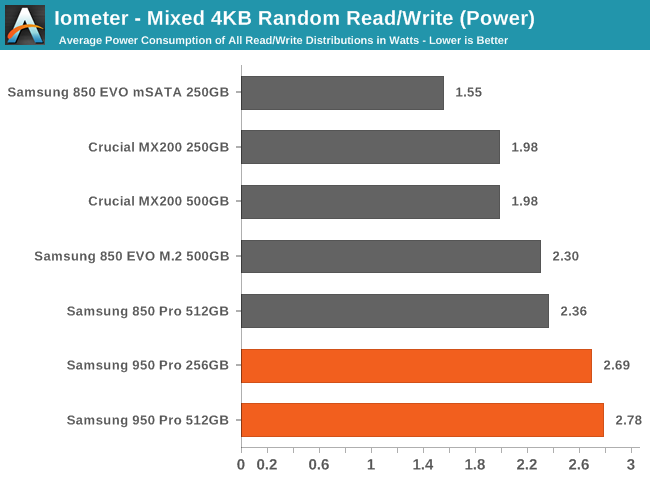
In this case, the higher power consumption of the 950 Pro is very well justified by the higher performance.
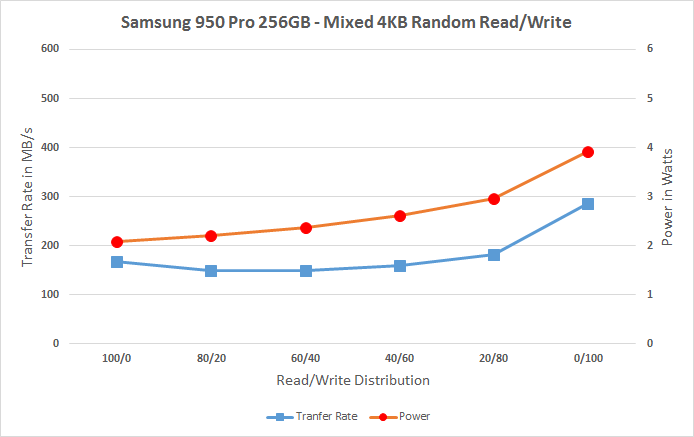 |
|||||||||
There's not much variation across the different workloads. Performance hardly drops during the middle of the test where many controllers have trouble with a balanced mix, but on the other hand the performance at either end of the test is nothing spectacular. Power consumption climbs hand in hand with the proportion of writes, but is accompanied by some increasing in overall data rate.
Mixed Sequential Read/Write Performance
The queue depth of 3 is sufficient for many drives to perform very well at either end of this test, while testing 100% reads or 100% writes. In between, performance typically suffers greatly, and that's where the winners and losers of this test are determined. Anything that's duplicating duplicating or transforming a large amount of data on the drive will produce I/O patterns similar to this test. Creating a System Restore snapshot, backing up files to a different directory on the same drive, and file compression can all produce interleaved reads and writes of large blocks of data, though not necessarily fast enough to be limited by the drive's performance.
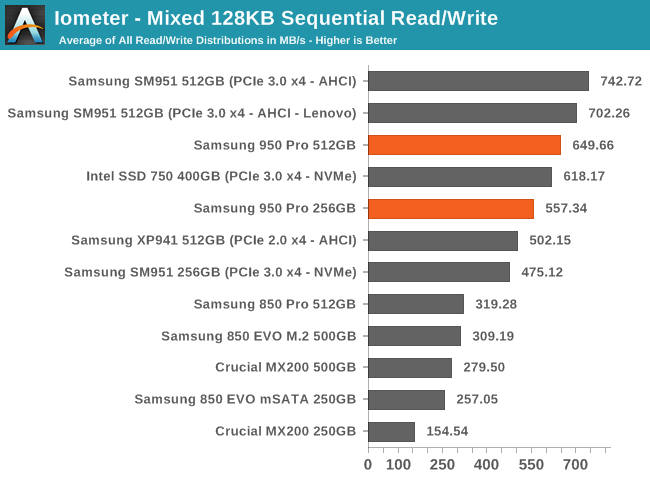
These sequential workloads allow the PCIe drives to stand out and achieve average speeds that would saturate SATA.
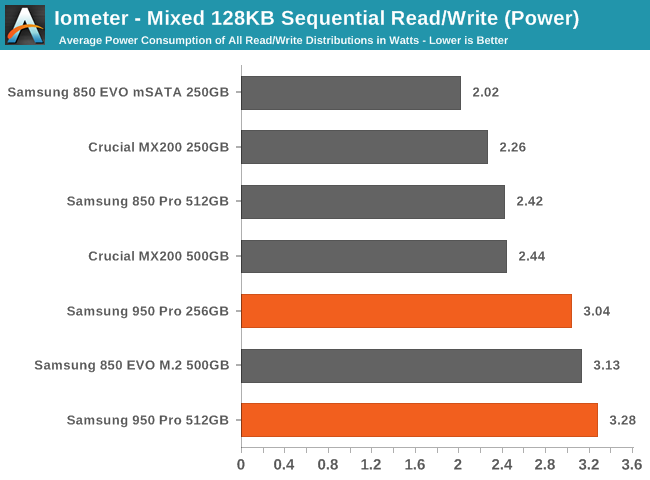
With power consumption in the same neighborhood as the SATA drives, the 950 Pro is significantly more efficient.
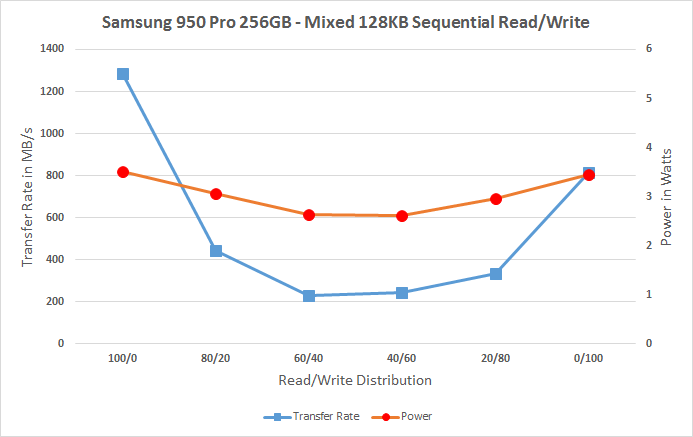 |
|||||||||
Looking at the breakdown by workload, the 950 Pro performs well on the balanced mixes and far outstrips the SATA limit on the very read-heavy workloads and the pure write section at the end of this test.










142 Comments
View All Comments
ElBerryKM13 - Saturday, November 14, 2015 - link
If you had $1000 to spend which one would you get? this 950 pro m.2 or intel 1.2TB m.2?srieppo - Monday, December 21, 2015 - link
Get two 950 in RAID 0. I'm currently running that and it's amazing. What you should put money on depends on your needs though. For gaming SSD is not very important. But I already run 6700k with fast memory and 980TI SLI so was a logical next step.1TB of superfast SSD is the last bit. HDD for storage, power options to shut the HDD down when idle (silent) and online backup for important data is the way I like...
mapesdhs - Monday, December 14, 2015 - link
Typo on pp. 9, the word "duplicating" is shown twice, or was that a really late April Fool? :Dmapesdhs - Tuesday, December 15, 2015 - link
Pondering whether to get a 950 Pro 256GB for a SkyLake laptop (MSI GE72 6QF). Despite the glowing benchmark results, it looks as if there would be little gain for real world usage compared to, say, an 850 EVO M.2 which is way cheaper (132 UKP for 500GB, vs. 147 UKP for 950 Pro 256GB), uses less power and thus would afford longer battery life. Edging towards the 850 EVO despite my nerdy addiction to speed...Killerkicker2011 - Wednesday, December 30, 2015 - link
Would the 950 pro work with my Macbook Pro Late 2013?Quarysma - Saturday, January 16, 2016 - link
I bought 950 pro but i having trouble rate. My system test results as follows:836 / 806 MB/s read/write.My system: Asus Z97m plus, 2*8 Corsair 2400 Mhz. i5-4690K, Corsair h110i, 1000W PSU.
I wonder why I'm having problems ?
Thanks for all...
robitlgnaz - Tuesday, February 2, 2016 - link
I have Asus Z97 deluxe with m.2 slot, but supporting only x4 PCI 2.0 (instead of x4 PCi 3.0).So on my mobo and yours too this m.2 support only 1.0Gbit or 1.000MB.;(
I think (and asking) that with PCIe adapter i and you can put that in x8 lanes of PCI 2.0 and get full spedd with that? I have only one graphics card so this is the only way, or?
Quarysma - Friday, February 26, 2016 - link
Either we get PCI-e card or will switch to the DDR4 system. I moved to a DDR4 system.I'm ordered DDR4 system and waiting for the parts.
yury2808 - Tuesday, April 12, 2016 - link
Beware! This drive (950 Pro / 512 GB) is terribly slow, if you set your disk to be "compressed" in Win7/10. I used it save my vmware space for years with other SSD drives (intel/samsung/ocz) and never had an issue.But yesterday, we got 2x nvme 950 pro and found, that speed is dropping almost immediately to ... 3 MB/s with huge latency.
I don't know, how their firmware goes around benchmarks (which are all cool for 'incompressible' data) but for real life - this drive get a HUGE hit when OS compress data.
ps. sure, I have plenty CPU for it, so it's not the case.
Redstorm - Saturday, April 23, 2016 - link
Be aware the new Samsung NVMe driver 1.1 drops performance by about 10% across the board. They should update the article with new perf numbers as its giving a false impression ATM.